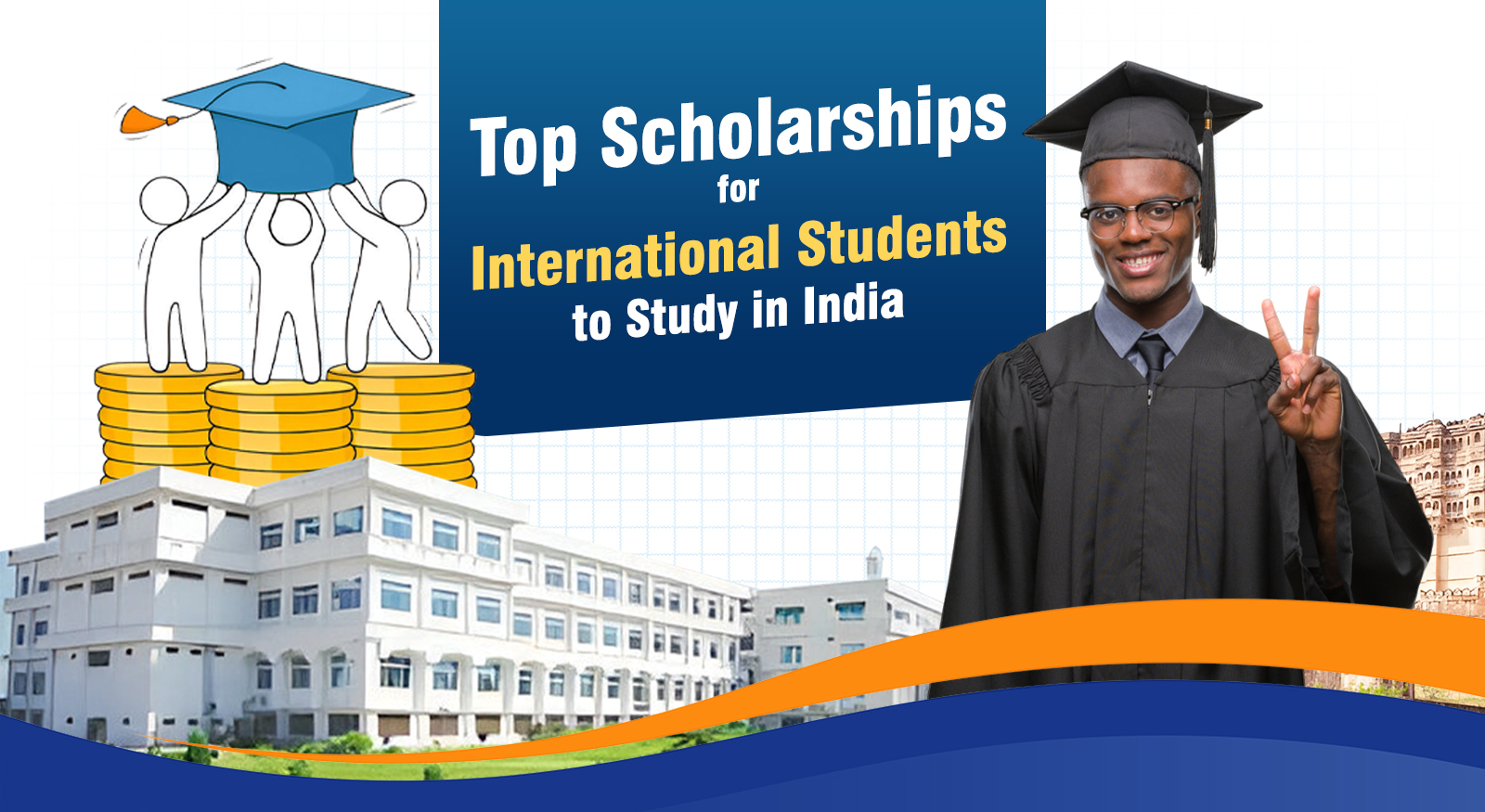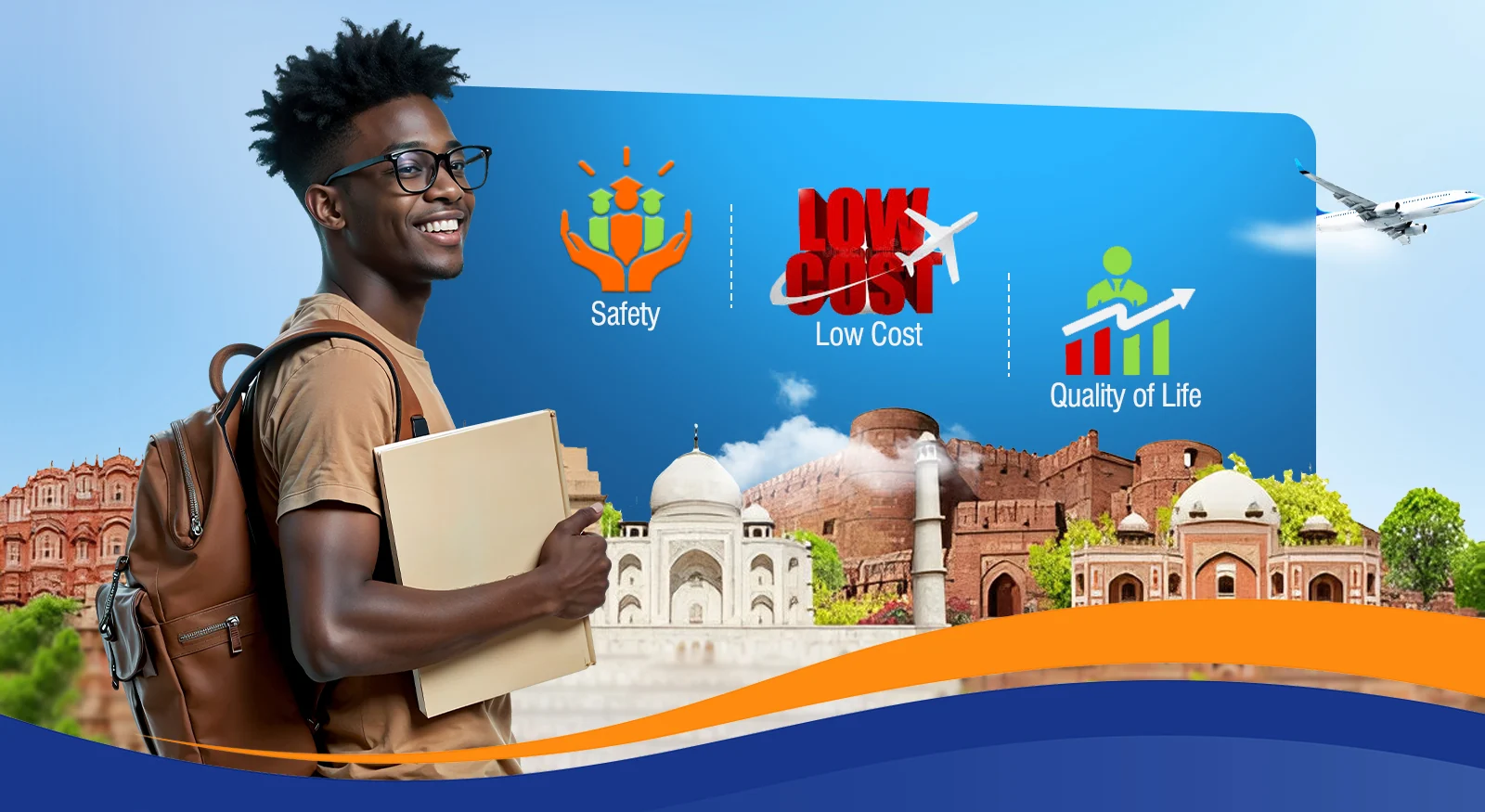.jpg)
India is fast emerging as one of the leading destinations for international students. With over 1,000 English-medium universities, international standing in engineering, business, medicine, humanities, and more, and affordable tuition fees and living costs, India offers a compelling combination of choices. This guide in 2025 helps you make all the correct steps, from choosing a university to adapting to life after graduation in India.
Increased global recognition of India's leading institutions—like the IITs, IIMs, IISc, JGU, TISS, and NLSIU—as they climb international rankings and attract global partnerships. It's great value to study here: undergraduate course fees per annum usually between $1,000 (₹80k) and $3,000 (₹240k), and postgraduate courses between $1,500 (₹120k) and $10,000 (₹800k), much lower than comparable degrees at U.S., U.K., or Australian universities. While living expenses are generally in the range of ₹15k–22k/month for Tier-1 and ₹10k–18k/month for Tier-2 or Tier-3 cities.
English is the de facto language of instructions in most of the universities, thus international students enjoy easy learning and class interactions. Aside from academics, India has a vast cultural environment—festivals, ancient historic sites, food culture, and vibrant student clubs that enable global networks and friendships.
Read Also: Top Indian Colleges For B.Tech For International Students
Technocrats and engineering aspirants prefer IITs (Delhi, Bombay, Kanpur, Madras, etc.), IISc Bangalore, and IISERs nationwide for B.Tech, M.Tech, and PhD in AI, robotics, and quantum computing. Management career aspirants perform best in IIM Ahmedabad, XLRI, SPJIMR, and JGU's School of Business, which rule management studies with consulting, tech, and finance placements.
For law and policy, JGU's law school NLSIU Bangalore and TISS Mumbai offer undergraduate and postgraduate courses in LLB, LLM, and international relations, all in English.
Medicine and life sciences are adequately represented in AIIMS, BHU, MAHE Manipal, and SRM with MBBS, BDS, PharmD, and biotech certifications. Liberal arts courses thrive at Ashoka University, Krea University, and Christ University in areas such as psychology, philosophy, social sciences, and computer science.
Read Also: Top Scholarships For International Students To Study In India In 2025
Foreign students are required to hold qualifications that are at par with India's 12th standard or an undergraduate degree, depending on the level of the programme. English proficiency is necessitated by all universities through IELTS (6–7) or TOEFL (80–100) for all except students from English-speaking nations or those seeking English-medium UG course admissions.
The entrance examination differs for disciplines: engineering accepts JEE Main/Advanced or DASA/SAT; management depends on CAT, XAT, or GMAT; law demands CLAT; and medicine employs NEET for MBBS admissions. Materials usually consist of a formal transcript, statement of purpose (SOP), two recommendation letters, CV/resume, copy of passport, passport photo, proof of funds, and medical certificate.
Applications are made through the university websites or the Study in India website. Candidates shortlisted are provided with an offer of admission letter to use when applying for an S-type student visa.
Read Also: How to Choose the Right College in India for Your Career Goals
The Indian government's ICCR scheme provides students from specific countries with full scholarships. The Study in India Scholarship program by the Ministry of Education also provides full and partial fee exemptions. Merit scholarships to entice foreign brains are provided by JGU, Amity, Ashoka, O.P. Jindal, and Parul institutions.
Erasmus+ and Commonwealth Scholarships, or home-country missions in India, are other international funding opportunities that may be pursued by the students. For a high probability, the applicants would need to demonstrate good academic performance, co-curricular activities, and well-defined reasons in their SOP.
Read Also: The Rise of EdTech: How Technology is Reshaping Modern Education
Charges are reasonably diverse—UG courses generally range between ₹50k–250k annually, but professional or engineering courses may go up to ₹200k–1 million per annum. Fees vary by location: city metro (Delhi, Mumbai, Bangalore) ₹20k–30k/month, middle-tier cities ₹15k–22k/month, and small towns like Mysore or Coimbatore ₹10k–18k/month. Average monthly expenditures are ₹6k–10k for rent, ₹5k–8k for food and bills, ₹1k–2k for travel, and ₹2k–4k for mobile/internet, books, and entertainment. Frugal habits consist of shared housing, eating local food, walking or using public transport, and shopping at local bazaars.
Read Also: How to Choose the Right College in India for Your Career Goals
Hostels on campus are ₹2k–10k/month and may come with meals; international and girls' separate blocks are provided at some hostels. Private PG or shared apartments are ₹5k–25k/month based on the city and facilities. For security, universities offer 24/7 security guards, CCTV camera surveillance, and women-only accommodations. It is advisable to obtain accommodations from secure university-approved sources, possess legal rental deeds, and get registered under the local FRRO within 14 days of arrival (required for over 180 days' stay).
Read Also: Common Eligibility Criteria For Scholarships Offered To Foreign Students In India
Foreign students require an S-type student visa. The applicants put in after having been accepted, along with the offer letter, proof of finance, medical fitness certificate, and passport. Enrollment is necessary on arrival as per FRRO regulations. There is a need for global health insurance, and COVID-19 policies—vaccine documentation and tests prior to arrival, for example—are subject to some jurisdictions for a limited time frame. The avoidance of unauthorized work is necessary—volunteering is an option, but paid labor is restricted (campus part-time only, with university-specific policy). To stay out of trouble, attendance for classes must be regular, visas must be renewed in time, and the passport must be valid.
Post completion of a master's program, students can get the 2-year International Students Visa (ISV) and acquire work experience in India. Career fields are IT, pharma, research, finance, manufacturing, social development, and policy. India also has a supporting startup ecosystem—such as Atal Innovation Mission and university incubators—so it is ideal for emerging entrepreneurs. Indian qualifications are well recognized everywhere in the world, so it is easier for graduates to pursue further studies or apply for postgraduate study elsewhere globally, with the added advantages of solid academic foundation and research experience.
Location matters. Tier-1 cities such as Delhi, Mumbai, and Bangalore provide cosmopolitan lifestyles, exposure, and excellent institutions at a premium price. Tier-2 cities such as Pune, Chennai, Hyderabad, Ahmedabad, Mysore, Indore, and Coimbatore are cheap to live in, provide excellent educational opportunities, and boast very high safety scores. They enjoy lower rentals, improved surroundings, and community lifestyle. Safety is always top in the cities ,Coimbatore, Indore, Mysore, Chennai, and Pune, and so they are liked by female students as well as those who want an equal student life.
Secure on-campus accommodation in advance, and choose well-known PG accommodation while off-campus. Offer local hospitality and make new friends. Master a few key phrases of the local language—it opens more doors and binds you closer to locals. Keep tabs on expenditure through student-friendly money apps, and have a monthly stipend for security arrangements and emergency funds. Join university clubs, workshops, and volunteer work to speed up personal and professional development.
Choosing India in 2025 is choosing an education system that is rich in quality, availability, and diversity. From state-of-the-art technical colleges to global-focused liberal arts institutions, India boasts unparalleled educational opportunities. With English-language instruction, competitive cost structures, and an open international community, India is not just a place to study, but a place to become, connect, and begin your global future. Begin your journey here and learn why India is fast emerging as the world's coolest destination for students.
.jpg)







.jpg)
